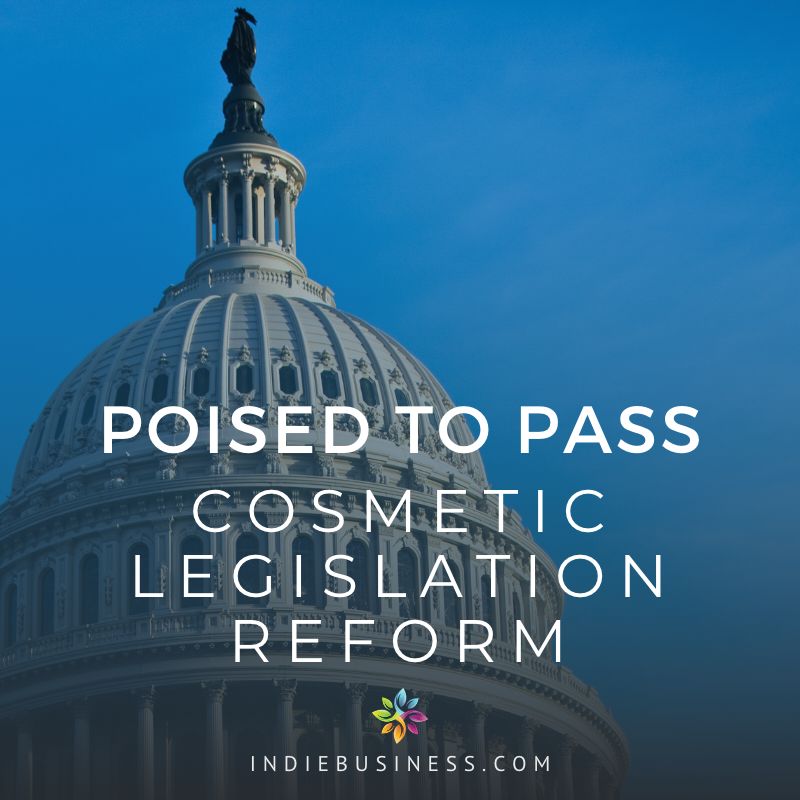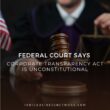Join us on January 31 for our live member event: “Understanding the Key Provisions of MoCRA“
Since 2008, the Indie Business Network has been involved in legislative advocacy efforts regarding updating federal cosmetic laws which have been in place since the 1940's. We didn't start blogging it until a few years later, and for you history buffs, here is one of our first posts about a trip to Capitol Hill to meet with legislative staffers. Fast forward nearly 15 year and it appears that new cosmetic legislation is finally poised to pass.

This article provides a high level overview of some of the highlights of the final bill as currently drafted. It is not a full summary.
The information here is excerpted from an announcement at the Coalition of Handcrafted Entrepreneurs (COHE) which, if you make cosmetics, I encourage you to join COHE. (It's free!)
Known as the Modernization of Cosmetics Regulation Act of 2022 (MoCRA) the bill is a work in final progress, and while nothing can be taken fully for granted until it actually passes, it appears that the current version of legislation is poised to pass by the end of the year.
This article provides a summary, and share how the Indie Business Network will help our members embrace, understand, and comply with the new legislation.
What You Need to Know About Cosmetic Reform
1. There are no fees
Over the years, several versions of various bills have included the requirement that cosmetic manufacturers pay fees to provide financial support for regulatory implementation and enforcement. The final bill contains no fees.
2. There is an exemption for “small businesses”
Of particular importance to members of the Indie Business Network, the bill contains an exemption for United-Stated based small businesses from most of the new provisions.
If your “average gross annual sales in the United States of cosmetic products for the previous 3-year period is less than $1,000,000, adjusted for inflation,” you are not subject to the Good Manufacturing Practices (see below) or registration requirements (see below) of the legislation.
Note that these exemptions do not apply for manufacturers of products that:
“regularly come into contact with mucus membrane of the eye under conditions of use that are customary or usual,”
“are injected,” “are intended for internal use,‘
“are intended to alter appearance for more than 24 hours under conditions of use that are customary or usual and removal by the consumer is not part of such conditions of use that are customary or usual”
3. The bill requires compliance with Good Manufacturing Practices, unless you are exempt
Good Manufacturing Practices (GMP) is a set of guidelines that help cosmetic companies consistently manufacture products that are safe and of high quality. Currently, GMP are guidelines. This bill makes them mandatory unless your company is exempt as described above. Click here for more on GMP from FDA.
4. The bill requires registration, unless you are exempt
The bill contains a new registration requirement that applies to cosmetics companies that are not exempt as described above. Currently, registration is voluntary under FDA's Voluntary Cosmetic Registration Program. Many Indie Business Network members are already registered under the current VCRP. It is expected that the new registration requirement will resemble the VCRP. Click here for more on the VCRP from FDA.
5. The bill requires adverse event reporting for all cosmetic manufacturers (no exemption)
The bill includes a requirement that companies report adverse events shared by their customers, specifically:
(i) death;
(ii) a life-threatening experience;
(iii) inpatient hospitalization;
(iv) a persistent or significant dis21 ability or incapacity;
(v) a congenital anomaly or birth defect;
(vi) an infection; or
‘(vii) significant disfigurement (including serious and persistent rashes, 3 second- or third-degree burns, significant hair loss, or persistent or significant alteration of appearance), other than as intended, under conditions of use that are customary or usual; or requires, based on reasonable medical judgment, a medical or surgical intervention to prevent an outcome described.
6. The bill requires safety substantiation (no exemption)
Consistent with current legal requirements, companies are required to substantiate the safety of the products they sell. Specifically, the bill defines “safe” as, “not injurious to users under the conditions of use prescribed in the labeling thereof, or under such conditions of use as are customary or us.”
Fortunately for artisan and small batch cosmetic makers, requirement is already being met.
For example, among other things, the following supports safety substantiation: “evidence or information that is considered, among experts qualified by scientific training and experience to evaluate the safety of cosmetic products and their ingredients, sufficient to support a reasonable certainty that a cosmetic product is safe.”
7. The bill gives FDA mandatory recall authority
Artisans generally think globally while they live locally. While their products are made in communities on a “small batch” level, their views about the world and their place in it are anything but small minded. They tend to work overtime to source naturally occurring ingredients and components that can be extracted with little to no harm to the physical environment and the people and animals in it.
Next Steps
While this is a work in progress and nothing can be taken fully for granted until a new law actually passes, according to COHE, both the Senate and the House are expected to pass the new legislation by the end of this week, after which President Biden is expected to quickly sign it into law.
Once the bill becomes law, industry participants will have approximately 12 months to comply. As always, the Indie Business Network and me personally, will be with IBN members every step of the way to help them embrace, understand, and comply with the new legislation in the coming months.
We are currently revamping our 1Q 2023 live virtual trainings to fully cover the new legislation and help our members implement and comply with it.
Want Even More Historical Background?
If you're really curious about the history of this piece of legislation, and if you have a lot of time on your hands, you can read dozens of posts summarizing how we got to this point in our Legislative Advocacy section.



